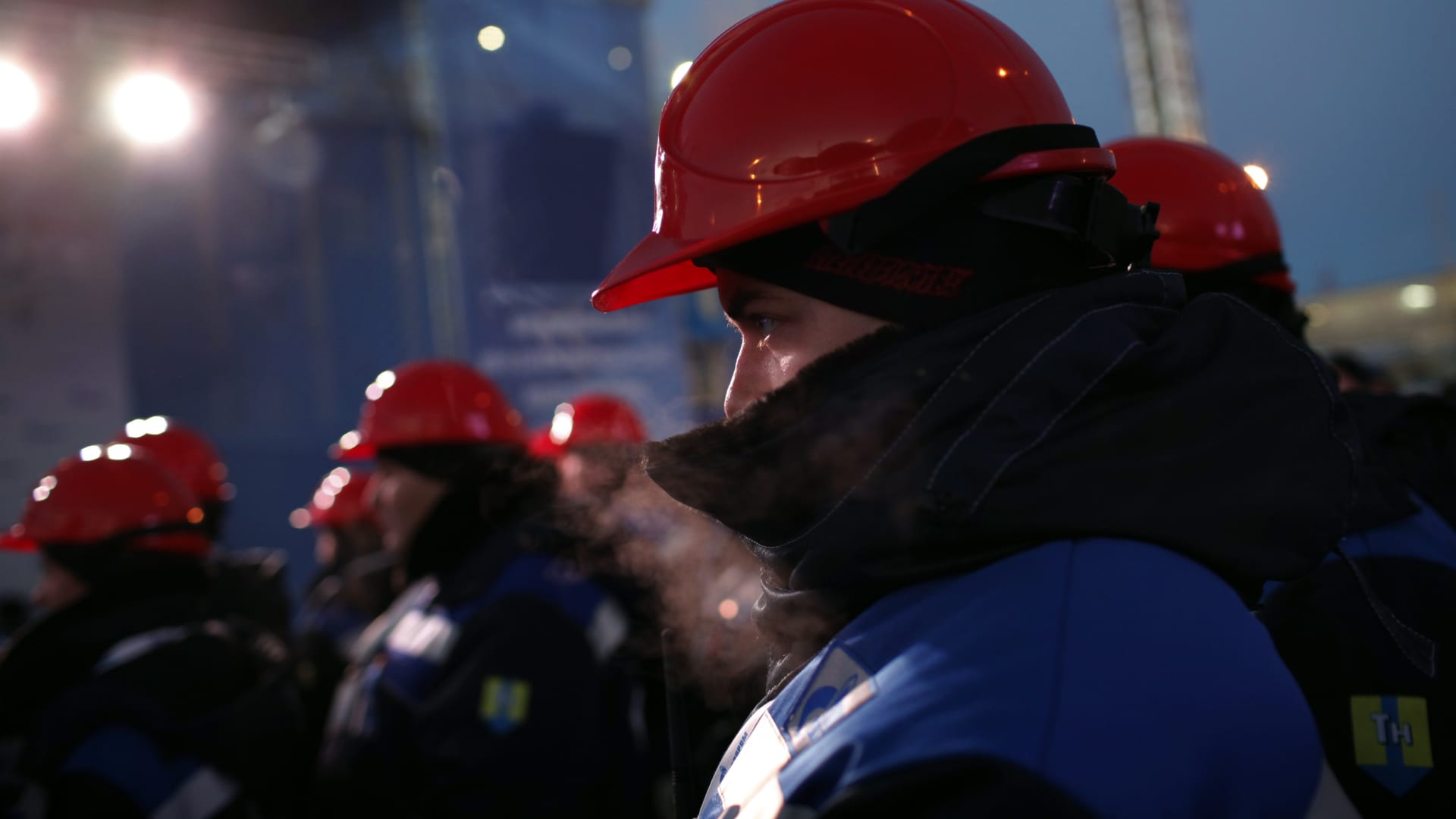
Gazprom workers on the Yamal Peninsula in Russia.
Bloomberg | Bloomberg | Getty Images
Russia’s gas supplies to eastern Europe are looking highly uncertain after the country’s state-run gas giant Gazprom told Poland and Bulgaria that it would halt supplies.
The move comes after both countries refused Moscow’s recent demand to pay for gas supplies in rubles, but also coincides with a sharp rise in tensions between Western allies and Russia as the war in Ukraine continues into a third month.
Early Wednesday morning, Gazprom released a statement saying it had halted supplies to both Poland and Bulgaria — both heavy consumers of Russian gas — due to payments not being made in the Russian currency. It said supplies would resume once these payments were made.
In the statement, Gazprom warned both countries against any “unauthorized withdrawal” of gas supplies flowing through their territories.
“Bulgaria and Poland are transit states. In case of unauthorized withdrawal of Russian gas from transit volumes to third countries, supplies for transit will be reduced by this volume.”
Forewarned, forearmed
Poland’s state-owned oil and gas company PGNiG said Gazprom had informed it on Tuesday that it would halt supplies that are delivered to the country via the Yamal pipeline, starting Wednesday morning.
But after dropping to zero earlier Wednesday, physical gas supplies appeared to edge up again, data from the European Union network of gas transmission operators showed, according to Reuters. Poland, however, said the supplies had indeed been halted.
Bulgaria has not confirmed that its supplies have been stopped but its prime minister, Kiril Petkov, described the move as “blackmail” and said any halt in supplies would be a breach of contract. Bulgaria’s Energy Minister Alexander Nikolov said supplies to customers were guaranteed for at least a month ahead, Reuters reported.
Other business leaders and government officials have slammed the move by Russia.
The U.K.’s Deputy Prime Minister Dominic Raab said the move would add to Russia’s status as an “economic pariah” while James von Moltke, chief financial officer of Deutsche Bank, told CNBC Wednesday that it was a “worrying sign” and that while it won’t have an immediate economic impact, “it remains a risk for the overall outlook.”
Even before the invasion of Ukraine, gas supplies had become a point of tension between Russia and its European neighbors with the Kremlin accused of using energy supplies, with any restrictions impacting dramatically on market prices, as a geopolitical weapon.
Russia vehemently denied this, with Russian President Vladimir Putin calling the accusations “blather” and saying the U.S. had contributed to a global energy crisis last fall.
But Russia’s latest toying with its European energy customers comes, ostensibly, after its demand to be paid in rubles for its gas was largely refused by importers in the region, including Poland and Bulgaria. They said the demand is a breach of contract while analysts said the move was a way for Russia to try to boost the ruble as international sanctions imposed, because of its unprovoked invasion of Ukraine, hit its economy and currency.
Situation being monitored
In the meantime, eastern Europe’s gas supplies appear to be in flux, and under threat, as Western support for Ukraine — and pressure on Russia — only increases.
Poland’s gas company PGNiG said in a statement Tuesday that the company is monitoring the situation “and is prepared for various scenarios,” and to receive gas from other sources. It said that the country currently has enough gas in storage, however, and is meeting demand.
Bulgaria imported almost 73% of its natural gas from Russia in 2020, EU data showed, while Poland imported around 45% of its natural gas from Russia in the same year, just above the EU-wide average of around 40%, showing the bloc’s significant dependence on Russian gas imports.
Moscow’s invasion of Ukraine has prompted the EU to hasten a reduction in Russian energy imports and has caused the already-controversial Nord Stream 2 gas pipeline between Russia and Germany, another country heavily reliant on Russian gas, to be abandoned.
Not all countries have refused Russia’s demand to pay for gas in rubles.
Hungary — whose strongman leader Viktor Orban has friendlier ties with President Vladimir Putin — has broken ranks with its EU partners by agreeing to pay for Russian gas in rubles.
Its foreign minister said Wednesday that the country is receiving Russian gas according to its contract with Gazprom via Bulgaria and Serbia.
“I want to assure everyone that the non-delivery of gas shipments to Bulgaria does not mean a halt in transit shipments via Bulgaria,” Foreign Minister Peter Szijjarto said on his Facebook page in comments translated by Reuters.
He said Hungary’s next payment obligation for Russian gas is due in mid-May, and the country will transfer its payment in euros to Gazprombank, where the amount will be converted into rubles.




